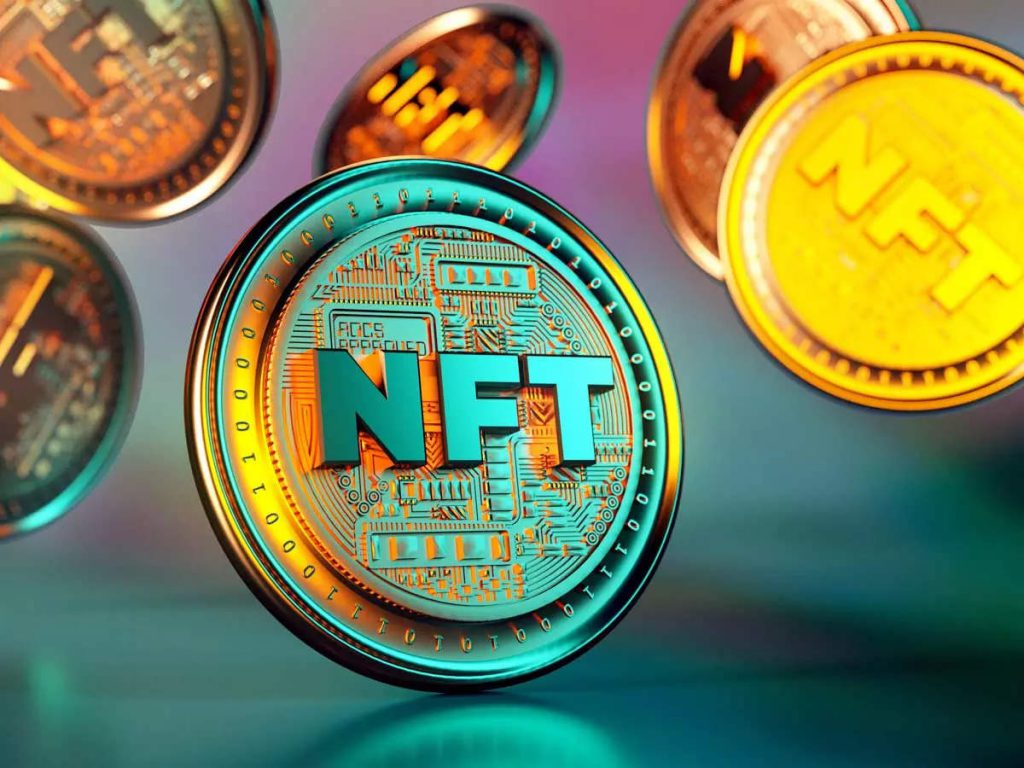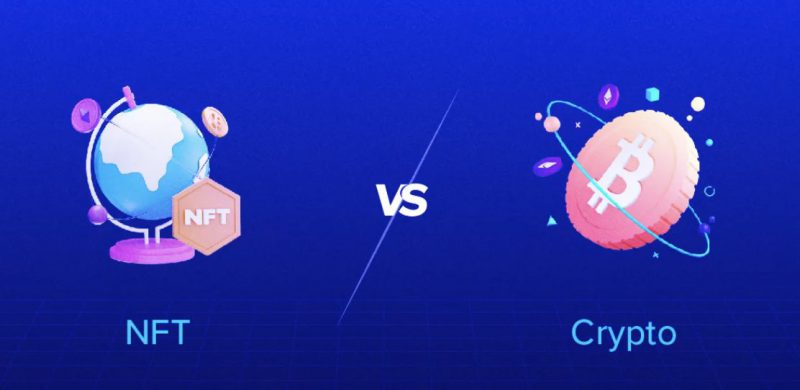The Difference Between NFT and Cryptocurrency: A Comprehensive Guide
In the world of digital assets, two prominent types dominate the market: cryptocurrencies and non-fungible tokens (NFTs).
While they both exist in the digital realm, they serve distinct purposes and have unique characteristics.
In this comprehensive guide, we will delve into the key differences between NFTs and cryptocurrencies, explore their functionalities, and understand how they have revolutionized the digital landscape.
Also read: Stablecoins Account for 86% of Transfer Volume: NFTs, Gaming Chip In 0.18%


Understanding NFTs and Cryptocurrencies
To grasp the disparities between NFTs and cryptocurrencies, it is crucial to comprehend their fundamental definitions and functionalities.
What are NFTs?
NFTs, or non-fungible tokens, represent unique digital assets that cannot be replicated. Unlike conventional cryptocurrencies that are fungible and interchangeable, each NFT has its distinct value and cannot be exchanged for another NFT.
People commonly use NFTs to depict digital items like art, music, videos, collectibles, and even real estate.
They reside on a blockchain, a decentralized and secure digital ledger that validates their authenticity and ownership.
Also read: FC Barcelona Gets $132 Million Investment for NFT, Web3 Initiative
What are cryptocurrencies?


Cryptocurrencies, on the other hand, are digital or virtual currencies that utilize encryption techniques to secure transactions and control the creation of new currency units.
They are based on blockchain technology and operate on decentralized networks.
Unlike NFTs, cryptocurrencies exhibit fungibility, implying that each unit of a specific cryptocurrency retains identical value and is exchangeable for another unit of the same cryptocurrency.
Now that we have a basic understanding of NFTs and cryptocurrencies, let’s explore the differences between the two.
Definition
The primary distinction between NFTs and cryptocurrencies lies in their definitions and underlying concepts.
NFTs link digital or physical assets to a unique cryptographic token on a specific blockchain network. They represent unique items and are indivisible.
Each NFT has its value and cannot be replicated. Examples of NFTs include digital art, music albums, virtual real estate, and trading cards.
Cryptocurrencies, on the other hand, are virtual currencies that utilize cryptography to secure transactions and control the creation of new currency units.
They are designed with fungibility in mind, allowing each unit of a specific cryptocurrency to be interchangeable with another unit of the same cryptocurrency. Bitcoin (BTC) and Ethereum (ETH) are well-known examples of cryptocurrencies.
Value Determination
The determination of value for NFTs and cryptocurrencies varies significantly.
The value of NFTs is subjective and depends on factors such as the rarity, desirability, and uniqueness of the digital item they represent. The value of an NFT can fluctuate based on market demand and the reputation of the creator.
Artists and creators can set their prices for NFTs, and buyers determine the value through their willingness to pay. The reputation and popularity of the artist or creator often influence NFT values.
However, market forces such as supply and demand dynamics, investor sentiment, and overall market conditions primarily determine the value of cryptocurrencies.
Cryptocurrency prices can be highly volatile and fluctuate significantly within short periods.
In contrast to NFTs, the value of cryptocurrencies isn’t linked to the uniqueness or rarity of a particular digital item. Instead, it’s determined by the perceived value and utility of the underlying blockchain technology.
Volatility
When comparing NFTs and cryptocurrencies, one can observe a distinct contrast in the level of volatility associated with each.
NFTs tend to be relatively stable in terms of their value and are less subject to market volatility compared to cryptocurrencies.
The value of an NFT is primarily driven by factors such as the reputation of the creator and the desirability of the digital item it represents.
While NFT values can still fluctuate based on market demand, they generally do not experience the same level of extreme price swings as cryptocurrencies.
In contrast, people enjoy cryptocurrencies for their substantial volatility.
Prices of cryptocurrencies can experience rapid and significant fluctuations due to various factors, including market speculation, regulatory developments, and macroeconomic events.
Cryptocurrency investors need to be ready for price volatility and comprehend the risks tied to these investments.


Purpose
Another crucial difference between NFTs and cryptocurrencies lies in their purposes and use cases.
NFT uses include establishing ownership and provenance of digital assets.
They can represent a wide range of digital items, including art, music, videos, virtual real estate, and game items.
NFTs enable creators and artists to monetize their digital creations by selling them directly to buyers and retaining ownership rights. NFTs also offer the ability to include smart contracts, which allow creators to earn royalties from subsequent sales of their NFTs.
Cryptocurrencies, on the other hand, are a medium of exchange and a store of value.
Cryptocurrencies enable secure and decentralized transactions, eliminating the need for intermediaries such as banks.
Used include online purchases, investments, and remittances.
Cryptocurrencies provide individuals with greater control over their finances and offer an alternative to traditional fiat currencies.
Trading and Marketplaces
Traders engage in NFTs and cryptocurrencies through distinct platforms and marketplaces.
NFTs are typically bought and sold on specialized NFT marketplaces. These platforms provide a space for artists, creators, and collectors to showcase, buy, and sell NFTs. Some popular NFT marketplaces include OpenSea, Rarible, and SuperRare.
NFT transactions are often conducted using cryptocurrency as the medium of exchange.
Cryptocurrencies, on the other hand, are traded on cryptocurrency exchanges. These exchanges allow users to buy, sell, and trade various cryptocurrencies.
Some well-known cryptocurrency exchanges include Binance, Coinbase, and Kraken. Cryptocurrency exchanges provide liquidity and facilitate the conversion of cryptocurrencies into traditional fiat currencies.
Ownership and Replicability
One of the fundamental differences between NFTs and cryptocurrencies is the concept of ownership and replicability.
NFTs establish ownership and provenance of digital items by linking them to unique tokens on a blockchain. Each NFT has a unique identifier, making it easily distinguishable from other tokens. This ensures that NFTs cannot be replicated or replaced.
The blockchain records NFT ownership, ensuring transparency and immutability.
Cryptocurrencies, on the other hand, are fungible and can be replicated. Every unit of a specific cryptocurrency has an identical value and can be swapped for another unit of that same cryptocurrency.
Cryptocurrency transactions involve the transfer of ownership from one wallet to another, but the individual units of the cryptocurrency are not distinguishable from one another.


Portability and usability
When it comes to portability and usability, NFTs and cryptocurrencies differ in their practical applications.
Cryptocurrencies offer greater portability and ease of use compared to NFTs. You can store cryptocurrencies in digital wallets and easily transfer them between individuals or use them for online transactions.
Merchants and service providers widely accept them, making cryptocurrencies more practical for everyday use.
NFTs, on the other hand, are often less portable and have limited usability in comparison. While you can store NFTs in digital wallets similar to cryptocurrencies, their main applications revolve around owning and trading digital assets.
NFTs are unique and specific to the digital item they represent, making them less versatile for general transactions.
Security
Security is an important consideration when dealing with digital assets.
NFTs leverage the security features of blockchain technology to ensure the authenticity and immutability of digital assets. The decentralized nature of blockchain makes it difficult for fraudulent activities to occur, providing greater security for NFT transactions.
However, it is essential to note that the security of NFTs is also dependent on the security of the underlying blockchain network and the individual’s digital wallet.
Cryptocurrencies also benefit from the security features of blockchain technology. A distributed network of computers encrypts and verifies cryptocurrency transactions, providing resistance against fraud and tampering.
Yet, hacking attempts, phishing attacks, and vulnerabilities in digital wallet platforms can compromise the security of cryptocurrencies.
Cryptocurrency holders must take the necessary precautions to secure their digital assets.
Regulatory Environment
The regulatory environment surrounding NFTs and cryptocurrencies varies across jurisdictions.
NFTs are still relatively new, and regulatory frameworks for them are currently under development.
The legality and regulatory status of NFTs can differ between countries. Individuals participating in NFT transactions must understand and comply with relevant regulations and laws.
Moreover, tax authorities are currently exploring the taxation of NFTs.
Cryptocurrencies, on the other hand, have faced more regulatory scrutiny due to their potential impact on financial systems and the potential for illicit activities.
Many countries have established regulatory frameworks for cryptocurrencies, and individuals participating in cryptocurrency transactions must comply with relevant regulations, including anti-money laundering and know-your-customer requirements.
Conclusion
In conclusion, while NFTs and cryptocurrencies share some similarities as digital assets, they differ in their definitions, value determination, volatility, purposes, trading platforms, ownership characteristics, portability, and regulatory environments.
NFTs offer unique and non-replicable digital assets, while cryptocurrencies provide fungible digital currencies. Both NFTs and cryptocurrencies have transformed industries and opened up new possibilities in the digital realm.
As technology continues to advance and evolve, the potential applications and impact of NFTs and cryptocurrencies are likely to expand further.
Remember to conduct thorough research and seek professional advice before engaging in NFT or cryptocurrency transactions. Stay informed about the latest developments in this rapidly evolving space, and always prioritize security and compliance with applicable regulations.
Disclaimer: This article is for informational purposes only and should not be considered financial or investment advice. Always conduct your research and consult with professionals before making any financial decisions.





